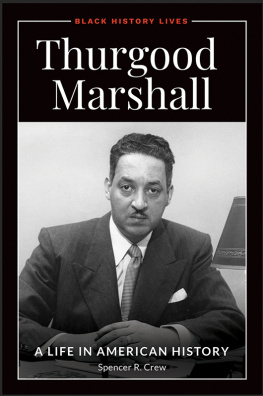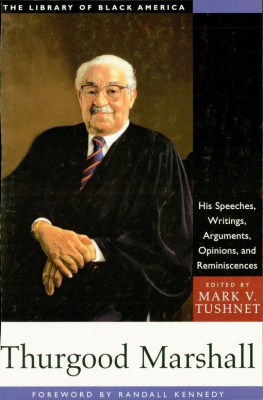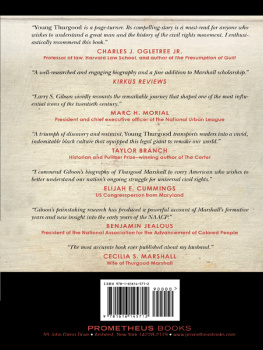John Marshalls
Constitutionalism
SUNY Series in American Constitutionalism
Robert J. Spitzer, editor
John Marshalls
Constitutionalism
Clyde H. Ray
Published by State University of New York Press, Albany
2019 State University of New York
All rights reserved
Printed in the United States of America
No part of this book may be used or reproduced in any manner whatsoever without written permission. No part of this book may be stored in a retrieval system or transmitted in any form or by any means including electronic, electrostatic, magnetic tape, mechanical, photocopying, recording, or otherwise without the prior permission in writing of the publisher.
For information, contact State University of New York Press, Albany, NY
www.sunypress.edu
Library of Congress Cataloging-in-Publication Data
Names: Ray, Clyde, author.
Title: John Marshalls constitutionalism / Clyde H. Ray.
Description: New York : State University of New York Press, [2019] | Series: SUNY series in American constitutionalism | Includes bibliographical references and index.
Identifiers: LCCN 2018033270 | ISBN 9781438474410 (hardcover : alk. paper) | ISBN 9781438474427 (ebook)
Subjects: LCSH: Marshall, John, 17551835Political and social views. | JudgesUnited StatesBiography. | Constitutional lawUnited States. | Constitutional historyUnited States. | United States. Supreme CourtBiography. | United StatesPolitics and governmentHistory.
Classification: LCC KF8745.M3 R39 2019 | DDC 342.73dc23
LC record available at https://lccn.loc.gov/2018033270
10 9 8 7 6 5 4 3 2 1
A society grows great when old men plant trees whose shade they know they shall never sit in.
Greek proverb
Contents
Acknowledgments
T his book would not have been written without the many teachers, colleagues, and friends who have helped me better understand John Marshall. I am grateful, first of all, to Michael Lienesch for his careful criticism and editorial comments on the dissertation out of which this book emerged. Mike has been a patient and generous mentor since the very beginning of my time at the University of North Carolina, and his extensive feedback on the prose and arguments of this book were invaluable. In addition, Jeff Spinner-Halev, Susan Bickford, Sandy Kessler, and Kevin McGuire provided detailed suggestions that helped clarify and strengthen my arguments concerning Marshalls political thought. Other individuals deserve credit for helping this work along in more informal conversations. In particular, I am deeply appreciative to Luke Perez, Luke Sheahan, and John-Paul Petrash for their intellectually enriching advice and good friendship.
Over several years, the University of North Carolina at Chapel Hill, Duke University, Western Carolina University, and the Institute for Humane Studies provided important financial and creative support for my research on this book. Without their help, the writing of this book would have taken a much longer amount of time. SUNY Press has paved the production of this work with smooth efficiency. Michael Rinella and Rafael Chaiken have provided able editorial assistance, and the book has benefited greatly from the feedback of three anonymous reviewers who commented on an earlier version of this manuscript.
Throughout the production of this book, indeed throughout life, I have been blessed with the support of a wonderful family. For years, my wife, Gladys, and sons, William and Ambrose, lived alongside the day-to-day life of a writerto say nothing of a graduate student. For their ongoing encouragement, understanding, and love, I will always be grateful. I dedicate this work to them.
). I am grateful to the publishers of these journals for allowing me to share revised versions of these pieces with readers of this volume.
Introduction
John Marshall and the American Constitution
S eated on the ground floor of the United States Supreme Court, the oversized statue of Chief Justice John Marshall is a mute reminder of a figure whose opinions and career most shaped the nations judiciary. Like many of the monuments in the Capitol, the sculpture of Marshall is at once solid and remote, a bronze testament to both the greatness of his mind and the distance separating his time from our own. In prose by turns sober and rousing, his words impress us with the strength of mind that shaped the rule of law into the hallmark of American government it represents today. But it would be a mistake to believe that Marshalls words are merely of historical importance, too far removed in time and place to guide Americans contemporary conversations about the Constitution. Like Marshall, we continue to tie the Constitutions authority to the ongoing project of creating a more perfect union. In fact, Marshalls political thought has a great deal to teach Americans today.
This book is an investigation of that political thought. At the outset, it is important to distinguish its purpose from the many existing studies of Marshalls legal legacy. If ever a Mount Rushmore of Supreme Court justices is built, surely his face would be the first to be chiseled. He has done more to establish the Constitution of the United States on sound construction than any other man living, President John Quincy Adams once wrote. So we have been told, and so we believe. Yet in spite of his prominence in the realm of legal discourse, Marshalls political thought remains a subject of surprisingly little scholarly attention. This neglect is unfortunate, because Americans continue to grapple with many of the same issues of constitutional theory Marshall confronted. Thus, an engagement with Marshals thought offers more than a better appreciation of perhaps our most important Supreme Court justice. It also speaks to and clarifies many of the questions and debates Americans continue to have regarding the Constitution.
Of course, the broad outlines of Marshalls political views are familiar to most students of the founding era. When it came to everyday politics, his beliefs were fairly straightforward: an unwavering commitment to the Federalist Party of Washington and Adams, a strong national government, and a robust, relatively unhampered market economy are among its trademarks. But the political philosophy underlying these principlesespecially as it related to the fledgling role of the Constitution in the nationis terrain that remains largely unexplored. Underneath Marshalls apparently uncompromising beliefs lies a larger political theory neither uniformly liberal nor republican but tethered above all to the authority of the Constitution. And just as it was the centerpiece of his thinking, so too he hoped it might become the guidepost for Americans with their own diverse political philosophies.
To some extent, the reasons for neglecting Marshalls political theory make sense. Marshalls opinions addressed timely political controversies rather than timeless principles of political theory. Unlike other members of the founding generation, he did not drink deeply from the wells of abstract political philosophy. Consumed instead with details of disputes, parties, and resolutions, little space remained for the detached speculation and high philosophy that we sometimes find in the writings of contemporaries such as James Madison and Thomas Jefferson. philosopher. Nevertheless, his writings were inevitably both political and theoretical, insofar as he addressed timely controversies as well as timeless themes of political thought. For this reason, he deserves to be considered an important contributor to the history of American political thought.






